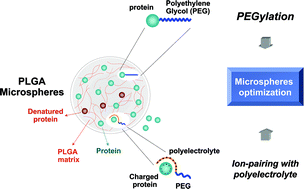Poly(lactide-co-glycolide) (PLGA) microspheres have been widely investigated as controlled-release carriers for proteins. Proteins may undergo physical denaturation and chemical degradation during microspheres fabrication and during evaluation in simulated physiological conditions, making the controlled delivery of proteins a daunting task. Generally, such formulations show undesirable release patterns, making them unsuitable for most therapeutic applications. Over the past ten years, there has been some success in overcoming issues associated with PLGA microspheres encapsulating proteins. Two approaches that are discussed in this Feature Article have shown very promising results: expanding the commercial and therapeutic success of protein PEGylation, and ion-pairing proteins with polyelectrolytes to improve microspheres fabrication, characteristics, and performance.
You have access to this article
 Please wait while we load your content...
Something went wrong. Try again?
Please wait while we load your content...
Something went wrong. Try again?


 Please wait while we load your content...
Please wait while we load your content...